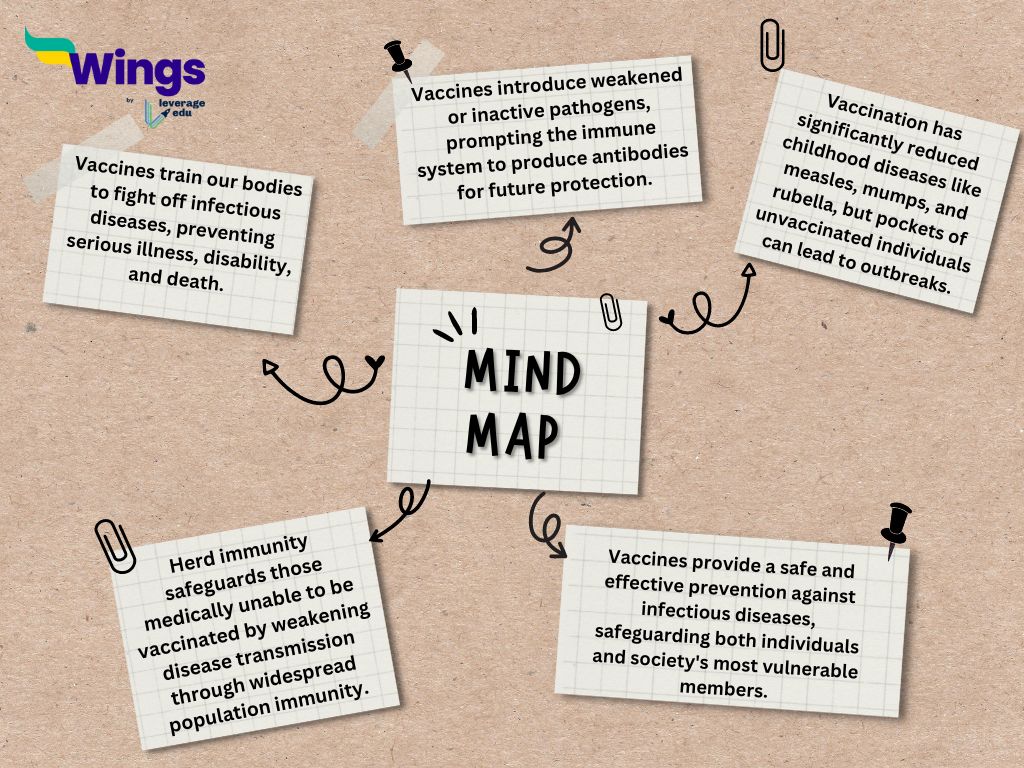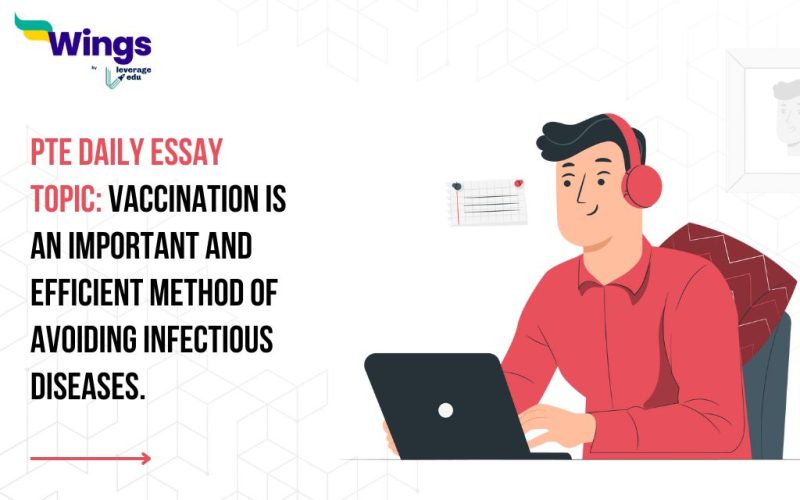Brainstorming Ideas
Refer to the following brainstorming ideas to get a solid understanding of the answer.
- Vaccines train our bodies to recognise and fight off infectious diseases, preventing serious illness, disability, and even death.
- Vaccines work by introducing a weakened or inactive form of a virus or bacteria into the body. This triggers the immune system to produce antibodies, proteins that can efficiently combat the actual disease if encountered later.
- Diseases like measles, mumps, and rubella, once common childhood illnesses, have seen dramatic declines thanks to widespread vaccination. However, pockets of unvaccinated individuals can create breeding grounds for outbreaks.
- When a large portion of the population is immune, the chain of transmission for a disease is weakened, effectively protecting those who cannot be vaccinated due to medical reasons.
- Vaccines offer a safe and effective way to prevent infectious diseases, protecting not only individuals but also the most vulnerable members of our society.

Q. Vaccination is an important and efficient method of avoiding infectious diseases. Should parents be legally required to vaccinate children against common diseases or do they have the right not to vaccinate their children?
Ans. Vaccines are one of the greatest triumphs of modern medicine. These ingenious biological tools train our bodies to recognise and fight off infectious diseases, preventing serious illness, disability, and even death. While the debate around mandatory vaccination continues, the overwhelming scientific evidence and the potential consequences of skipping vaccinations make a compelling case for prioritising the health of our children and communities through widespread immunisation.
Vaccines work by introducing a weakened or inactive form of a virus or bacteria into the body. This triggers the immune system to produce antibodies, proteins that can efficiently combat the actual disease if encountered later. This approach is far safer than contracting a full-blown illness, which can lead to severe complications like pneumonia, brain damage, or even death. Diseases like measles, mumps, and rubella, once common childhood illnesses, have seen dramatic declines thanks to widespread vaccination. However, pockets of unvaccinated individuals can create breeding grounds for outbreaks, putting not only themselves but also vulnerable populations like newborns and immunocompromised individuals at risk.
The concept of herd immunity underscores the importance of vaccination rates exceeding a certain threshold. When a large portion of the population is immune, the chain of transmission for a disease is weakened, effectively protecting those who cannot be vaccinated due to medical reasons. This herd immunity fosters a collective shield, safeguarding the entire community. Therefore, the decision to vaccinate extends far beyond the individual child. It’s a social responsibility that ensures the well-being of future generations.
In conclusion, the benefits of vaccination are undeniable. Vaccines offer a safe and effective way to prevent infectious diseases, protecting not only individuals but also the most vulnerable members of our society. While some may advocate for parental choice, the potential consequences of widespread vaccine hesitancy are severe. By prioritizing vaccination, we can ensure a healthier future for all.
Analysis
Paraphrased Statement: Vaccines are one of the greatest triumphs of modern medicine.
Thesis Statement: Vaccines are biological tools that train our bodies to recognise and fight off infectious diseases, preventing serious illness, disability, and even death.
Body Paragraph 1-Topic Sentences: Vaccines work by introducing a weakened or inactive form of a virus or bacteria into the body.
Body Paragraph 1- Supporting Reasons and Explanations: This triggers the immune system to produce antibodies, proteins that can efficiently combat the actual disease if encountered later. This approach is far safer than contracting a full-blown illness, which can lead to severe complications like pneumonia, brain damage, or even death.
Body Paragraph 2- Topic sentence: The concept of herd immunity underscores the importance of vaccination rates exceeding a certain threshold.
Body paragraph 2- Supporting Reasons and Explanations: When a large portion of the population is immune, the chain of transmission for a disease is weakened, effectively protecting those who cannot be vaccinated due to medical reasons. This herd immunity fosters a collective shield, safeguarding the entire community.
Conclusion: Vaccines offer a safe and effective way to prevent infectious diseases, protecting not only individuals but also the most vulnerable members of our society. While some may advocate for parental choice, the potential consequences of widespread vaccine hesitancy are severe. By prioritizing vaccination, we can ensure a healthier future for all.
Vocabulary in Use
| Word | Meanings |
| Ingenious | Inventive |
| Compelling | Exciting |
| Immunocompromised | Weakened immune system |
| Rubella | A contagious viral infection best known by its distinctive red rash. |
| Safeguarding | Guarding something |
| Underscore | Emphasize |
Connectors and Linkers
- While
- However
- Therefore
- In conclusion
Are you preparing for the PTE Exam? Check out the blogs below to bolster your chances of securing better scores in the PTE exam.
| Related Blogs | ||
| PTE Exam Pattern – How to Crack the … | PTE – An Exam That Takes You To Places | PTE Writing Essay-Questions Samples |
| PTE Syllabus – Know It Inside Out | PTE Exam: Everything You Need To Know | PTE Exam Pattern for Academic and General |
Download the Leverage App today.


Need help preparing for PTE? Check out the best PTE preparation courses in the market offered in a live training environment by trusted educators. If you want to help studying abroad, call 1800572130.


 One app for all your study abroad needs
One app for all your study abroad needs












 60,000+ students trusted us with their dreams. Take the first step today!
60,000+ students trusted us with their dreams. Take the first step today!